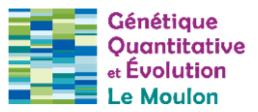
Centre National de la Recherche Scientifique CNRS
The GQE-Le Moulon unit (Génétique quantitative et Evolution - Le Moulon) lies on the Plateau de Saclay in Gif-sur-Yvette, France. It is part of Université Paris-Saclay and a member of the Institute Diversité, Écologie et Évolution du Vivant which will soon regroup three research units within the same building. We are also part of the Saclay Plant Sciences network which contributes to the teaching and training of students in plant biology, genetics and green biotechnology. GQE-Le Moulon currently hosts 32 permanent researchers and 22 permanent staffs from the Institut national de recherche pour l'agriculture, l'alimentation et l'environnement (INRAE), the Université Paris-Saclay (AgroParisTech and Faculty of Science), the Centre National de la Recherche Scientifique (CNRS). Our research activities are strongly committed to integrate data and processes (evolutionary forces) at different scales (from individuals to populations), to understand the importance of genetic variation for adaptation and the relation between genotype and phenotype. GQE-Le Moulon combines the skills of scientists from different disciplines including evolutionary biology, plant breeding, quantitative genetics, genomics, theoretical biology and applied mathematics who are strongly involved in teaching programs of Université Paris-Saclay, that makes it a unique place in France to study evolutionary quantitative biology while addressing societal questions on the management on plant genetic resources and the development of innovative breeding methods. Hence, our research activities are often conducted in tight collaborations with stakeholders such as citizen associations, farmers networks involved in participatory breeding and partners from the private breeding sector.
Role within INCREASE
The Centre National de la Recherche Scientifique (CNRS) will provide expertise to discuss strategies for pan-genomes development and genotyping. They will document routes of introduction of European legumes and quantify their impacts on genetic diversity extent and structure. Moreover, they will measure the impact of on-farm management practices and ex-situ conservation on genetic diversity of beans and build demographic scenarios to identify genomic footprints of selection, and propose candidate genes potentially involved in local adaptation.
Their work will include the analysis of phenotypes at multiple scales (from molecular phenotypes to more integrated phenotypes measured in the fields), the exploration of the phenotypic space within each species and the underlying trade-offs between traits. The team will link phenotypic to genotypic variation using association mapping to perform allele discoveries in each legume crop. This will include a small-scale study aiming at evaluating the potential of the bean genome for breeding for improved maize-bean intercropping abilities in terms of yield, nutrition and quality. From multi-environmental trials, they will estimate environment-specific allelic effects and allelic plasticity for each trait x species combination. We will develop approaches based on genomic selection to better value the use of genetic resources in breeding programs.
Main contacts

Dr Maud Tenaillon
Research Director

Dr Domenica Manicacci
Assistant Professor

Dr Amandine Cornille
Rsearcher

Dr Johan Joets
Research Engineer

Prof. Christine Dillmann
Full Professor

Dr Elodie Marchadier
Assistant Professor

Dr Adrienne Ressayre
Researcher

Dr Laurence Moreau
Research Director

Dr Tristan Mary-Huard

Dr Cyril Bauland
Research Engineer





